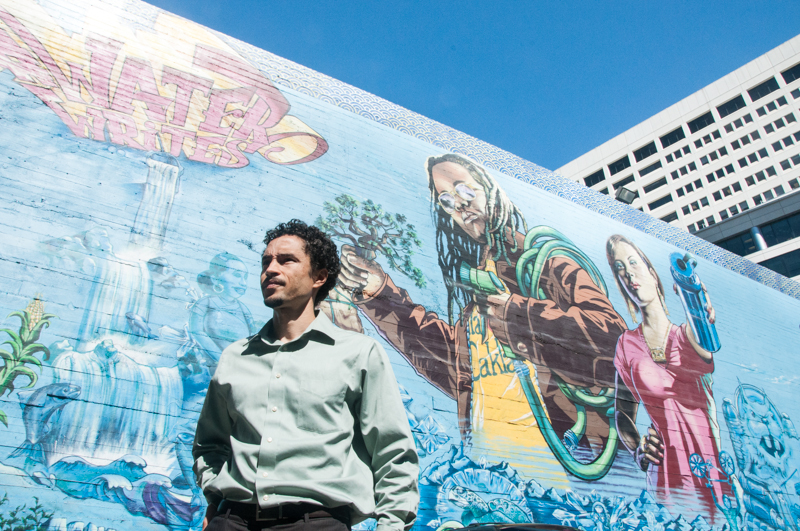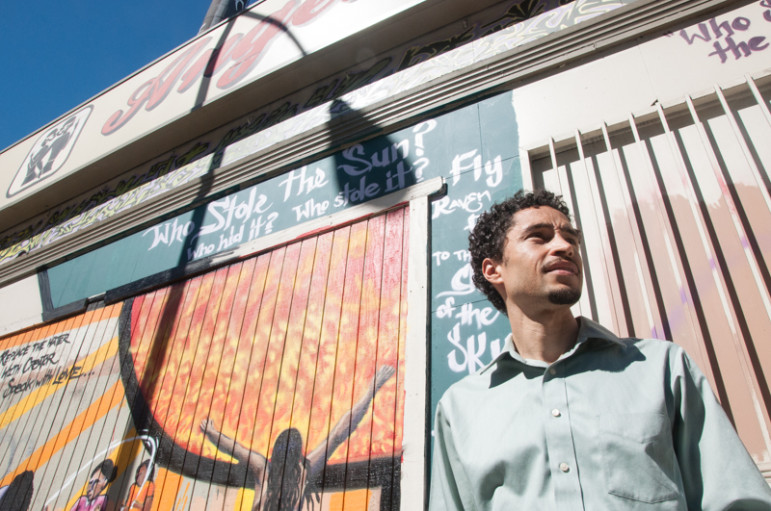
Katy McCarthy / JJIE
Zachary Norris, the new executive director of the Ella Baker Center in Oakland, Calif.
OAKLAND, Calif. -- For Zachary Norris, the new executive director of the Ella Baker Center, a major turning point in his career came after his first arrest. Handcuffed during an act of civil disobedience protesting a new mega detention center in the area, Norris was taken to the nearby Santa Rita Jail in Dublin. That night, sharing a cell with a crowd of other young black men, he recalled, “I had this sense it was all too normal, too normalized.”
Wearing a shirt that read, “Stop the Super Jail,” Norris’ fellow inmates constantly asked him what it meant. When he told them that they were trying to stop a juvenile hall from being built across the street, the response, Norris recalled, was that it was “messed up.” The young men he met that night said building the facility sent a message to a kid that once they got out of juvenile hall they would just end up across the street.
For a young man of color growing up in East Oakland, Norris’ 2001 arrest could have been a relatively standard experience (according to the Annie E. Casey Foundation, youth of color made up only 17 percent of the youth population of the county at that time, but represented a staggering 59 percent of the population at the juvenile hall). However, Norris’ night in jail was a singular moment that would fuel his commitment to prison reform advocacy for years to follow.
Bringing Family Members Into the Equation
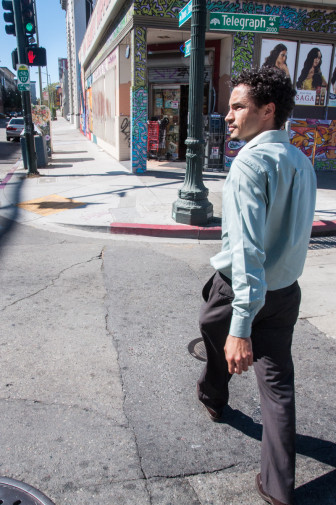
Katy McCarthy / JJIE
When talking about his life and his work, Norris, 36, is soft spoken, his sentences tapering into whispers. But the importance of reforming California’s youth prison system is not something he approaches with quiet or trepidation.
In 2004, Norris, fresh out of the New York University School of Law, was tasked by then Ella Baker Center director Lenore Anderson to build a statewide network of system-involved families. The goal was to create a unified voice against the juvenile justice system from those that had actually experienced its failures. This work became a key component to the founding of the Center’s Books Not Bars campaign, which, as the name suggests, was in favor of channeling funding away from imprisonment and toward alternative and rehabilitative programs.
“He was very compassionate,” Sue Burrell, staff attorney for the Youth Law Center, said of Norris’ work, “He really got that the system is supposed to be helping kids and families to move forward in their lives. So he was making a place for them at the table.”
While the broad mission of the Ella Baker Center has historically been to advance racial and economic justice for low-income people and people of color, Books Not Bars focused solely on reforming the California youth prison system, with families testifying and advocating every step of the way.
“His work was the first in really bringing family members into the equation,” Burrell said. “Before that, it was all advocates and agency people and it was really an important contribution to bring the parents of children who are affected by all of these policy decisions into the picture.”
Among many accomplishments, Books Not Bars lists closing five of the state’s youth prisons, facilitating the youth prison population’s decline from 4,800 to 922 children, and defeating the 2008 “tough on crime” Proposition 6.
“With allies, we’ve been successful, but it’s not by any means over,” Norris said. Some of those allies include the Center on Juvenile and Criminal Justice, Commonweal and the Youth Law Center, among others.
“It’s become more common since then that locking up young people and throwing away the key is not the way to go,” Norris said.
Taking the Helm at the EBC
“I’m concerned about public safety and I think it’s important that people know that I have two daughters, and I want them to grow up safely,” Norris said. “But I just don’t think that what we’ve done over the past 40 years has actually made communities safer.”
As he settles into his executive role at the Center, Norris is planning to lead three main strategies designed to promote more genuine community safety locally, as well as state and nationwide.
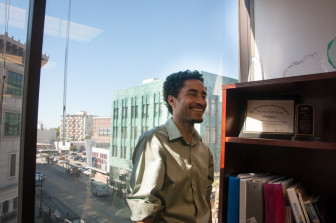
Katy McCarthy / JJIE
Zach Norris, executive director of the Ella Baker Center, in his office in Oakland, Calif.
“What we’re trying to do is build out our grassroots organizing capacity and be in partnership with likely and unlikely allies to move a books not bars, jobs not jails justice reinvestment agenda,” Norris said.
On a local level, the Center is working with Silicon Valley Debug/Albert Cobarrubias Justice Project (ACJP) to create a justice hub based on the ACJP model for families in California’s Alameda County to better assist them in navigating juvenile and criminal justice systems. As Norris foresees it, it will be a peer support group focusing on community-based organizing strategies to impact individual court cases. It will be “families getting together around a table discussing what cases are in front of them or their family members and developing strategies to impact those cases,” he said. “I think that often times, policy objectives could come out of that as well.”
Statewide, the Center is continuing to push for legislation that will “move resources from locking people up toward more supportive programs.”
On the national level, Norris said the Center is working with Justice For Families, Strong Families and other coalitions to plan and develop a national, community-driven research project looking at the multi-generational impact of incarceration on families from an economic and public health standpoint. “In some ways, families unlocking futures was the tip of a larger iceberg and we want to look at the iceberg,” he said.
“Too big, too far, too racist.”
In 1994, President Bill Clinton signed the Violent Crime Control and Law Enforcement Act into law. Among its many controversial actions, the act set aside a significant sum of money for the building of new prisons, some $2.3 million of which was slated to go to Alameda County to substantially expand the existing juvenile hall into what the Ella Baker Center deemed a “Super Jail.”
Led by Books Not Bars and the Youth Force Coalition, the “Stop the Super Jail” protests were crucial to hampering the expansion. Norris and co-workers staged rallies, sit-ins and the protest that would lead to Norris’ arrest. It was through this work that Norris first caught the attention of James Bell, the founder and executive director of the W. Haywood Burns Institute who, taking the route of policy, initially testified against the Super Jail. But the Center, he said, “was like ‘that’s not good enough, we need to pack the place. We need to have signs.’ At the time that was just not happening on youth justice issues.”
For the Super Jail campaign, Norris expanded the Center’s communication efforts as a means of enhancing their organizing. He championed the use of video clips to convey the problem and the work they were doing to solve it.
“They thought about messaging, which we didn’t,” Bell recalled. “It was that kind of stuff that made them different and successful. Bell mentioned a dinner party he attended with Ella Baker staff where they got into a debate about media and communications, saying at the time he was very anti-media. “Their position was like, ‘Actually you have no choice, the cat is out the bag,’” he said. “[They said] ‘You can’t ignore media. You have to engage.’ Now I have a two-person communication team.”
The work ultimately paid off. The facility was downsized and built in San Leandro, a more central location for the population it would eventually house.
Family… and the System
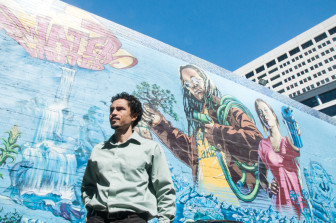
Katy McCarthy / JJIE
Zachary Norris was born in San Francisco in 1977, but moved to Oakland with his parents when he was a week old. “The proud Oaklander in me always says ‘a week too late,’” he said with a laugh.
Norris was raised very sheltered by working class parents. His mother was and still is an elementary school teacher, his father was a shipyard worker and later a janitor. In order for him to attend St. Mary’s College High School in North Berkeley his mother and grandmother “scraped and saved.”
The investment was worth it. After high school, Norris headed back east to attend Harvard University. “Harvard was cold. In all the ways you can think of,” he said.
The very first semester, his grandfather passed away and Norris wanted more than anything to go home to Oakland. He found an opportunity in the school’s recruitment program, which paid students to travel and visit high schools across the country. When he received the list of where he would be recruiting in Oakland, he was dismayed to see that no institutions in the Oakland Unified School District had made the cut. Regardless of the assignment, Norris added several public schools in the district to his rounds. The process of going to talk to teachers and learning the graduation rate was eye opening for Norris.
Through his experience with Books not Bars, Norris began to think about his own family differently. He had cousins in incarceration and his father was working as a janitor at the Alameda county juvenile hall. Thinking about his own family’s involvement encouraged him to think about how families in general interact with the system. “Part of how I came to look at how families are treated by justice systems is partly through my own family’s experience and partly through the work we did with Books Not Bars,” he said.
After three years as the director of Books Not Bars, between 2007 and 2010, Norris received a prestigious Soros Justice Fellowship to pursue a study on the impacts of the juvenile justice system on families of court-involved youth. The resulting report, “Families Unlocking Futures: Solutions to the Crisis in Juvenile Justice,” was very well received.
Michelle Alexander, author of “The New Jim Crow,” wrote about the report: “This extraordinary … must read … comprehensive study examines our youth prison system from the perspective of those who are most impacted — young people and their families.”
But as a man of words and action, Norris wanted his work to extend beyond research into the realm of tangible change. Partnering with Grace Bauer, a justice reform advocate and mother with a son in the juvenile system, he started Justice For Families. The mission of the organization was two-fold: transform the system to give families more power and a say in how decisions are made, and direct resources away from youth incarceration and toward family and community-based alternatives.
Through Justice For Families, Bauer and Norris created a national alliance of parents and organizations committed to fundamentally altering youth incarceration. In their work they sought to help families become better advocates for themselves and their kids, as well as to partner with local and state governments to consult on youth incarceration systems.
“The philosophy of having those people who are most affected by the system at the forefront of the solution is really important because it’s these individuals that understand the challenges that their family members and perhaps themselves face on a regular basis,” Kate McCracken, director of policy and development at the Center on Juvenile and Criminal Justice said. “Having that input – how programs are shaped, how policy is shaped—is essential to creating something that is useful in the future.”
Stopping the Cycle
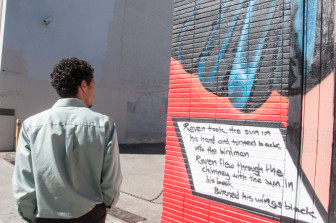
Katy McCarthy / JJIE
Norris has a knack for tracing events upstream to their headwaters and going straight to that source to make changes. This is evident in his decades-long work toward youth justice system reform by supporting the families through resources and research.
“We have a punishment-based economy that enshrines social exclusion across generations and we need a more supportive economy that helps people do well,” he said.
That night in Santa Rita, Norris foresaw a generational cycle wherein children would leave detention and literally move across the street to the adult jail where he stood. After speaking to the young men in his cell, Norris knew his path. He understood, he said, that he could have ended up in jail under very different circumstances without the support of his family.
“But for the sacrifices of my mom and dad, I could have been in the same situation,” he said.
It’s a thought that still guides his work today.
